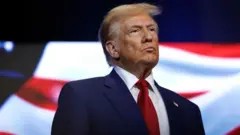Donald Trump’s ascension to the presidency despite facing multiple criminal indictments is unprecedented in US history. As the first president-elect with a felony conviction, his victory has thrown his numerous legal battles into sharp relief, raising critical questions about their future. While the presidency offers certain protections, it doesn’t erase these legal challenges entirely. Let’s delve into what could unfold for each of the major cases against him.
New York Hush-Money Conviction: Sentencing and Appeal
 Donald Trump looking to the right of the camera. He wears a navy suit jacket, white shirt and red tie.
Donald Trump looking to the right of the camera. He wears a navy suit jacket, white shirt and red tie.
Donald Trump, the first US president-elect with a felony conviction, now navigates a complex legal landscape.
In May, Donald Trump was found guilty on 34 felony counts of falsifying business records in New York, linked to hush-money payments to an adult film star. Although his sentencing was initially scheduled for September, Judge Juan Merchan postponed it to November 26, after the election. Despite Trump’s electoral victory, legal experts suggest the sentencing could still proceed as planned.
However, the likelihood of Trump facing imprisonment as a first-time, older offender is considered low. Former Brooklyn prosecutor Julie Rendelman points out that even if a prison sentence were handed down, Trump’s legal team would immediately appeal. They would argue that incarceration would impede his presidential duties and seek his release pending the appeal process. Rendelman notes that such an appeal could potentially extend for years, leaving the conviction unresolved during his term.
January 6 Case: Federal Prosecution and Presidential Power
Special counsel Jack Smith has charged Trump with federal crimes related to his efforts to overturn the 2020 election results. Trump has pleaded not guilty to these charges. The case faced legal uncertainty when the Supreme Court considered presidential immunity for actions taken while in office. While the Supreme Court acknowledged partial immunity, Smith refiled the case, arguing Trump’s actions to overturn the election fell outside his official duties.
Now, with Trump’s election win, the situation shifts dramatically. Former federal prosecutor Neama Rahmani argues that these federal charges effectively “go away.” The established legal precedent is that a sitting president cannot be prosecuted at the federal level. This could lead to the dismissal of the election fraud case in DC District Court.
Furthermore, Trump’s power as president-elect adds another layer. Should Smith resist dismissing the case, Trump could simply remove him. Trump himself stated in a radio interview in October his intention to fire Smith “within two seconds” if elected, underscoring the potential for presidential intervention in this case.
Classified Documents Case: DOJ Appeal and Potential Dismissal
Jack Smith is also leading a separate federal case concerning Trump’s alleged mishandling of classified documents after leaving the White House, charges Trump denies. He is accused of storing sensitive documents at his Mar-a-Lago residence and obstructing Justice Department efforts to retrieve them.
Judge Aileen Cannon, a Trump appointee, initially dismissed the charges in July, questioning the legality of Smith’s appointment as special counsel. Smith appealed this dismissal, but Trump’s election victory significantly alters the landscape of this case.
Rahmani anticipates that the classified documents case will likely meet the same fate as the election interference case. He predicts that “the DOJ will abandon its Eleventh Circuit appeal of the dismissal of the classified documents case.” This suggests that the Department of Justice, under a Trump administration, would likely drop the appeal and potentially end the prosecution.
Georgia Election Case: State Charges and Delays
In Georgia, Trump faces state-level criminal charges related to his attempts to overturn the 2020 election results in that state. This case has already encountered obstacles, including challenges to District Attorney Fani Willis’s involvement due to a personal relationship with a lawyer on the prosecution team. An appeals court is currently reviewing whether Willis should remain on the case.
Trump’s election win is expected to further complicate and delay the Georgia case. Legal experts anticipate a pause in proceedings during his presidency. Trump’s lawyer, Steve Sadow, has suggested that the trial should not proceed while Trump is in office, citing the “supremacy clause and his duties as president of the United States.” This indicates a legal strategy to postpone the Georgia trial until after his term ends.
Presidential Pardon: Limited Scope
BBC banner graphic related to US election coverage.
A frequently discussed question is whether Trump could pardon himself. While theoretically possible and unprecedented, presidential pardons only apply to federal crimes. Trump’s New York hush-money conviction is a state felony, falling outside the scope of presidential pardon power. Therefore, a self-pardon would not impact the New York case.
BBC graphic promoting the US Election Unspun newsletter.
Conclusion: Legal Cases in Limbo
Donald Trump’s election victory introduces significant uncertainty into the trajectory of his legal challenges. While federal cases are likely to be dismissed or dropped due to presidential protections and his ability to influence the Justice Department, the state-level New York conviction and Georgia case present different scenarios. The New York case will proceed to sentencing, followed by a potentially lengthy appeal process. The Georgia case is expected to face delays and legal battles over its continuation during his presidency. Ultimately, Trump’s legal battles are far from over, but his presidency will undoubtedly reshape the legal landscape he navigates.